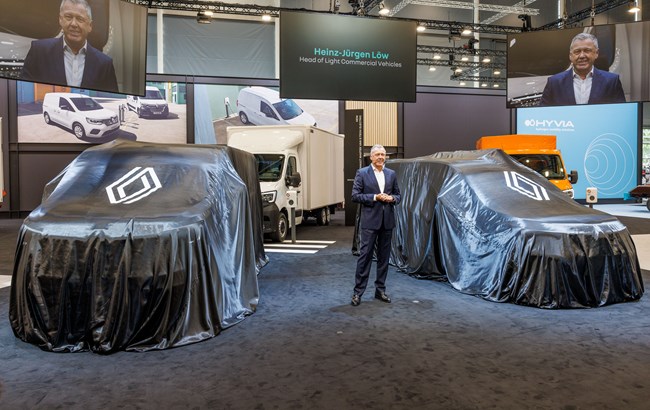- 'Luxury' tax on expensive pick-up trucks suggested
- ADVERTISEMENT FEATURE: Essential advice to avoid the van fleet ICE-berg
- ETRUX launches new Ford E-Transit Trizone
- Renault gives UK debut to Master E-Tech at CV Show
- Isuzu D-Max long-term test – Latest Report
- Isuzu D-Max V-Cross Steel Edition revealed
- IVOTY Report: Stellantis explores the hydrogen proposition
- New Maxus EVs include eDeliver 5 van
- Used LCV values reach six-month high
- ADVERTISEMENT FEATURE: IVECO Daily Mission Awards 2024 Q2 Round-up: Grounds Maintenance & Forestry
Renault hits out at Euro 7 delay
Date: Thursday, September 29, 2022 | Author: James Dallas

Renault’s head of light commercial vehicles has slammed the European Union (EU) for failing to confirm the requirements of the Euro 7 emission standard that is due to be implemented from 2025.
“It’s really a scandal,” said Heinz-Jurgen Low, who added that the lack of clarity surrounding the regulation, which, despite Brexit, will encompass the UK as well as countries within the EU, made it difficult for manufacturers to invest in the technology needed to further reduce tailpipe emissions from petrol and diesel vehicles.
The publication of the new regulation, which will replace the current Euro 6 standard, has been expected since 2021 but has now been delayed until November 2022. The postponement comes at a time when manufacturers are increasingly focusing investment on developing electric vehicle technology.
Low claimed Euro 7 would only deliver modest savings in CO2 compared to Euro 6 and added: “It’s better to invest in the real future, [electric vehicles].”
He said the delay in disclosing the Euro 7 requirements was “not very smart, it [meeting the standard] needs engineering [investment]”.
However, in a letter to the European Commission calling for the prompt publication of the Euro 7 emissions proposal, a group of health organisations, environmentalists and cities and regions, including Transport and Environment, the European clean transport campaign group, claimed: “The technology to reduce pollutant emissions is available. The costs are much less than the scaremongering by the industry leads us to believe. Euro 7 has been under development since 2018, it is now time for it to be published.”
The letter also stated: “The delay unacceptably hinders EU efforts to clean up toxic air pollution caused by road transport and unnecessarily puts EU citizens' health and lives at risk.”
With internal combustion engine production to be phased out by 2035 across Europe (the UK has set a target of 2030), Euro 7 is expected to be the final iteration of the emissions standard regime that was introduced in 1992. Manufacturers, however, are still expected to produce ICE-powered vehicles for non-European markets, such as Latin America, after this date.
View The WhatVan Digital Edition


